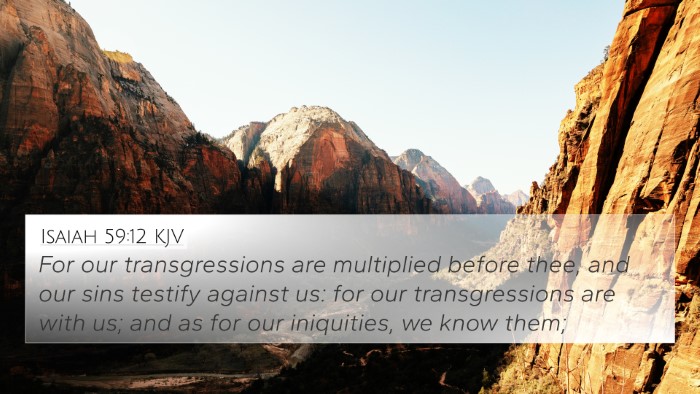Understanding Psalms 51:3
Bible Verse: Psalms 51:3
"For I know my transgressions, and my sin is always before me."
Meaning and Interpretation
This verse expresses a profound acknowledgment of personal sin and guilt. The author, traditionally understood as King David, is in a state of penitence following his sinful actions. This realization is critical in understanding the theme of repentance found throughout the Psalms.
Insights from Public Domain Commentaries
-
Matthew Henry:
Matthew Henry emphasizes the importance of self-examination in this verse. David’s awareness of his transgressions indicates a deep, personal confrontation with sin, acknowledging that it is not just a fleeting thought but a constant burden.
-
Albert Barnes:
Albert Barnes interprets this verse as a display of David's sincerity in his confession. His understanding that his sin is ever before him highlights the weight of unacknowledged guilt and how it impacts one’s relationship with God.
-
Adam Clarke:
Adam Clarke elaborates on the psychological turmoil sin inflicts on the soul. He suggests that this awareness serves as a catalyst for David's earnest plea for mercy, emphasizing the inner struggle between sin and the desire for redemption.
Cross-References to Psalms 51:3
To deepen our understanding of this verse, we can explore some related scripture passages. Below are several Bible verses that provide thematic connections and insights:
- Psalms 32:5: "Then I acknowledged my sin to you and did not cover up my iniquity." - This emphasizes the necessity of confession and the relief that follows.
- James 5:16: "Therefore confess your sins to each other and pray for each other so that you may be healed." - This verse affirms the communal aspect of dealing with sin.
- 1 John 1:9: "If we confess our sins, he is faithful and just and will forgive us our sins and purify us from all unrighteousness." - Highlighting God's faithfulness in forgiving sins when confessed.
- Romans 3:23: "For all have sinned and fall short of the glory of God." - This reminds us of the universality of sin, linking to a collective human experience.
- Isaiah 59:2: "But your iniquities have separated you from your God." - Discussing the relational impact of sin that David acknowledges in his plea.
- Proverbs 28:13: "Whoever conceals their sins does not prosper, but the one who confesses and renounces them finds mercy." - This reinforces the idea of transparency in dealing with sin.
- Psalms 38:4: "My guilt has overwhelmed me like a burden too heavy to bear." - A parallel expression of the weight of sin and guilt.
Thematic Connections and Cross-Referencing
The theme of repentance and recognition of sin spreads throughout the entire Bible, creating numerous connections between verses. Through comparative Bible verse analysis, it can be seen how the acknowledgment of sin in Psalms 51:3 resonates with other scriptural teachings regarding guilt, confession, and seeking divine forgiveness.
Tools for Further Study
For those examining the connections between Bible verses, various tools and methods are available:
- Bible Concordance: A tool that allows users to locate verses containing specific words or themes.
- Bible Cross-reference Guide: Resources that provide contextual links between scriptures.
- Cross-reference Bible Study: Techniques that enhance understanding of interrelated verses.
- How to Use Bible Cross-references: Learning strategies for identifying and utilizing cross-references effectively.
- Bible Reference Resources: Texts or databases that compile cross-referenced scripture for in-depth study.
Conclusion
Psalms 51:3 serves as a poignant reminder of the importance of confessing one's sins and the profound effects this acknowledgment can have on one's spiritual journey. Recognizing and understanding the connections between biblical texts enhances our grasp of repentance, grace, and redemption.












